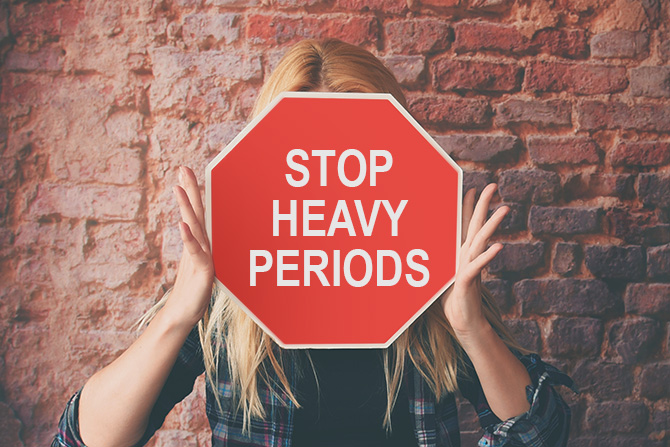
Overview [1]
Symptoms [2]
Causes [3]
Prescription [4]
Health Tips [5]
A normal menstrual cycle should occur every 28 days plus or minus seven days (21-35 days). With the duration of flow between two to seven days, with a volume loss of less than 80 mL or less than five tablespoons. Menorrhagia is menstrual bleeding that lasts more than seven days and bleeding that is very heavy. Heavy bleeding is defined as needing to change your tampon or pad after less than two hours or passing clots the size of a quarter or larger.
Untreated heavy or prolonged bleeding can result in iron deficiency anemia [6] and daily routines being hindered by excessive blood loss. Three quarters of hysterectomies (removal of the uterus) in Canada are performed as a result of unresolved heavy periods. Of the hysterectomies performed, 50 percent confirm the uterus to be free from disease.
Symptoms
- Bleeding so heavily that normal daily activities cannot be carried out
- Going through one or more tampons or pads every 2 hours
- Low iron; fatigue, paleness, shortness of breath, hair loss
- Menstruation lasting longer than a week
- Menstruation that occurs more than once in 30 days
- Needing to wear both a pad and a tampon at the same time
- Passing blood clots larger than a quarter
Causes
There are many underlying issues that cause menorrhagia. The most common cause is hormonal imbalances. In a normal menstrual cycle, estrogen increases in the first half of the cycle, ovulation then occurs and progesterone rises. If pregnancy does not occur progesterone falls, signaling the uterine lining to slough off. If you have menorrhagia, estrogen rises and is sustained causing the uterine lining to thicken. Estrogen is a strong hormone and inhibits progesterone further increasing estrogen, resulting in a thicker uterine lining. This specific cause is the most common cause of heavy bleeding in teenage and perimenopausal women.
Heavy bleeding may be a symptom of other underlying health issues. Some conditions that may cause heavy menstrual bleeding are:
- Adenomyosis – occurs when the uterine endometrial lining grows into the muscle wall of the uterus
- Anemia or low iron
- Cervical or uterine cancer
- Deficiency of vitamin K, which is vital for blood clotting
- Endometrial hyperplasia – an irregular thickening of the lining of the uterine walls, caused by excess estrogen without progesterone
- Hypothyroidism [7] (including subclinical low thyroid)
- Infections from STIs
- Liver disease
- Polycystic ovarian syndrome [8] – a prediabetic condition that may hinder proper ovulation
- Use of a copper IUD – may cause heavy bleeding in some women
- Uterine fibroids [9] – benign tumors consisting of smooth muscle and fibrous tissue
- Uterine polyps – also called endometrial polyps, are small growths found on the lining of the uterus
- The National Hemophilia Association predicts that up to three percent of women suffer from undiagnosed bleeding disorders such as von Willebrand disease (VWD), a genetic disease caused by a deficiency or a defect of a crucial blood clotting protein.
Prescription For Health
Finding and addressing the root cause of menorrhagia is important in order to correct the condition.
| Nutrient | Dosage | Action |
|---|---|---|
| Multivitamin with minerals (contains no iron) | As directed | Ensures adequate nutrient status; Vitamin B6 and magnesium are essential for treating menstrual abnormalities |
| BioFe® Iron [10] (Micronized & microencapsulated iron pyrophosphate III) | As directed | Helps to prevent iron deficiency and iron deficiency anemia; gentle formula with no constipation or stomach upset |
| D-glucarate* | 150 mg | Important for healthy metabolism of estrogen; supports normal cell growth; combined with I3C and sulforaphane; it stops abnormal periods and period pain |
| Curcumin*
(95% curcumin) | 50 mg | Prevents abnormal cell growth, detoxifies cancer-causing forms of estrogen |
| Indole-3-carbinol* | 150 mg | Eliminates excess toxic and cancer-causing estrogens
Has been shown to reverse abnormal PAP tests within three menstrual cycles Halts flooding periods and normalizes menstrual cycle |
| Rosemary extract* | 25 mg | Reduces tumor formation, is antioxidant |
| Di-indolylmethane (DIM)* | 100 mg | Antioxidant, reduces risk of cancer |
| Sulforaphane* | 200 mcg | Reduces risk of cancer
Stops abnormal cell growth Halts flooding periods and abnormal menstrual cycle |
| Chaste tree berry (Vitex)* | 80 mg | Balances estrogen-to-progesterone ratio |
| Zinc* | 6 mg | Zinc helps to increase progesterone and decrease estrogen
PMS sufferers are more likely to have low zinc |
| Vitamin K2 MK7 | 100 mcg daily | Stops heavy bleeding and clotting |
| Shepherd’s Purse Tincture | 20 drops every 2-3 hours during the first 2 days of heavy periods | Stops heavy bleeding and clotting |
| Cramp Bark Tincture | ½ teaspoon every 2-4 hours for acute pain | Relaxes the uterus and reduces cramps |
| Borage Oil | 2000 mg daily | Anti-inflammatory; controls inflammatory prostaglandins involved in pain and inflammation
Stops diarrhea and flooding periods |
Health Tips to Enhance Healing
- Add foods to diet that are high in vitamin K2 (eggs yolks, grass-fed organic eggs, sauerkraut, natto) and foods high in iron (dark green leafy vegetables, lentils, beans, organic chicken livers, oysters, mussels, pumpkin seeds).
- Address low iron levels.
- Have a doctor rule out conditions such as uterine fibroids [11], PCOS [12], and hyperinsulinemia.
- Have TSH levels tested to rule out a thyroid issue [13]. TSH should be between 0.5 and 2.0, anything above 2.0 may be contributing to heavy bleeding.
- Reduce estrogen levels.